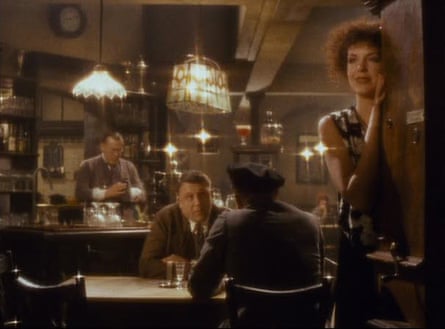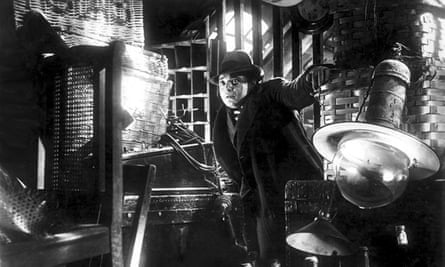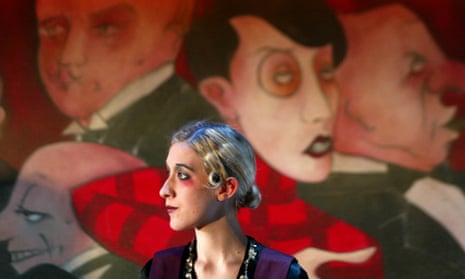My novel The Butchers of Berlin is ostensibly a thriller set in that city during wartime. It begins with the discovery of flayed corpses as the last of the city’s Jews are rounded up for deportation at the beginning of 1943. There was austerity, the mobilisation of the civilian reserve, shopkeepers and waiters, and an anti-corruption campaign against the top echelon. Very little was written about the city at this pivotal time, for the obvious reason that its best writers and artists had either fled or been reduced to silence
But the real point of The Butchers of Berlin was to try and reconnect to a strong, and suppressed, genre of cinematic writing about the city. I also wanted to touch on its art, particularly the forensic cartoons of George Grosz, and the expressionist films of the 1920s and early 30s where the sets imposed themselves on the human drama – the Third Reich was nothing if not an expressionist nightmare. To write about Berlin in 1943, it was necessary to look at what went before – the much freer and artistically productive period of Weimar Germany. The background reading and viewing I did underpins the novel in terms of what is missing.
What I was looking for is best summarised by Lotte Eisner in her book on the cinema of Fritz Lang: “In those restless days after the end of the [first world] war and the abortive attempts at revolution, the mad investment and the vast underemployment that were to give Hitler his opportunity, there was – what else could be expected? – a crop of mass murders.”
Actually, researching civilian life in Berlin 1943 turned out to have similarities to here, now: a country on the brink of unpropitious change, a corrupt elite, lack of opposition, empty rhetoric, slogans, austerity, nationalism, a xenophobic, depressed population. Jonathan Meades has pointed out similarities between National Socialism and New Labour, a tendency that persists in our glorious leader who, given her talent for dreary sloganeering, could have risen high in the ministry of propaganda.
These are 10 of the best books about the period.

1. Berlin Alexanderplatz by Alfred Döblin
Big and formally bold, this is the mother and father of Berlin novels, up there with Ulysses as a cornerstone of modernism. This knockabout and tragic legend of the holy drinker Biberkopf was filmed memorably by Fassbinder. Set in 1929, the Nazis are seen peddling their newspapers in the U-bahn; the writing is on the wall. Nobody nailed the Berlin zeitgeist better.
2. The Artifical Silk Girl by Irmgard Keun
Keun was encouraged by Döblin for her distinctive style. “I want to write like a movie,” she says, and proceeds to knock Isherwood’s I Am a Camera into a cocked hat. She has terrific way with ideas, simile (“as lazy as a corpse”) and visual takes: “There are many women on the Kurfürstendamm. They simply walk. They have the same faces and a lot of moleskin fur – not exactly first class, in other words, but still chic – with arrogant legs and a great waft of perfume about them.” Keun was too much for the Nazis; she fled to Ostend where she took Joseph Roth for her lover.
3. Wolf Among Wolves by Hans Fallada
Set in 1923 against the collapse of the economy, an appropriately inflated Zeitroman about epic gambling: “It was useless for Pagel to change his club, although at that time the number of gambling hells was as the sands of the sea, just as everywhere there were heroin and cocaine, “snow”, nude dances, French champagne and American cigarettes, influenza, hunger, despair, fornication and crime.”
4. Laughter in the Dark by Vladimir Nabokov
Nabokov lays his story out in his first paragraph. “Once upon a time there lived in Berlin, Germany, a man called Albinus. He was rich, respectable, happy; one day he abandoned his wife for the sake of a youthful mistress; he loved; was not loved; and his life ended in disaster.”
5. Black List: Section H by Francis Stuart
Novel rather than autobiography inasmuch as it sees its protagonist in a more flattering light than Stuart’s actual collaboration with the Third Reich. The strangest tale of how a well-connected, mystical Irish writer of republican sympathies ended up throughout the war in Berlin. Stuart (a version of whom appears in Butchers) spoke English throughout his time there, apparently remarked upon only once. A unique story of transgression and a dense semi-mea culpa.

6. Berlin Stories by Robert Walser
Written in the 1900s, Walser’s short observations amount to prose movies of city life – street scenes, parks and bars, electric trams, the veils of illusion. On Friedrichstrasse: “A bodily dream rising and falling with voluptuous breath then descends upon the street, and everything races, races, races with uncertain step in pursuit of this all-encompassing dream.”
7. Going to the Dogs: The Story of a Moralist by Erich Kästner
Better known for Emil and the Detectives and The Parent Trap, Kästner’s books were burned by the Nazis. Unlike others, he turned up to watch the conflagration and decided a life of internal exile was more interesting than flight. The story takes in job loss, drift, love found and lost, movies, fast women, debauchery, suicide and a lunatics’ cabaret: “The death drive was swallowed up in the howls of the survivors.”
8. The 20th of July by Hans Hellmut Kirst
Kirst was one of very few German writers to become a postwar international bestseller, with his Gunner Asch series, which showed the Third Reich through the eyes of an ordinary, reluctant soldier. His other hit, The Night of the Generals, was made into a wonderfully daft Hollywood film with Peter O’Toole doing his SS number. The 20th of July – about the failed assassination of Hitler – takes much of its material from the archive and has a documentary feel for Berlin in 1944.
9. Berlin: The Land of Cockaigne by Heinrich Mann
Mann, brother of Thomas, wrote Berlin in the tradition of the bildungsroman, and the introduction to the 1929 English edition offers fair summary: “Andrew Zumsee rises steadily, jesuitically, through the coarse social strata of bourgeois Berlin, behind the skirts of women, via boudoir wire-pulling, to an hour of vertiginous triumph, or at least an illusion thereof.” Life, as in many of these novels, is speculative: “I don’t know what it is that they call transacting business; but it certainly doesn’t take much time … It’s a lazy man’s Heaven, a perfect land of Cockaigne.”
10. The Queen of the Night by Marc Behm
Behm, an American settled in France, wrote one of the great novels of obsessive detective fiction, The Eye of the Beholder. Its predecessor was even weirder, one woman’s Sadean journey through the horrors of wartime “engulfed by the dementia of history”. Behm plays operatically with material usually treated with kid gloves and in 200 pages says more than Jonathan Littell’s The Kindly Ones manages in five times that. Inspired by The Magic Flute, what follows often reads like a disco version of Wagner, ending in notable squalor in the Berlin bunker for a blasphemous version of Downfall: “Hitler and his general staff escaping from Berlin in an Amt VI gas chamber! Lunatic!” Delirious, tasteless and sublime.

Comments (…)
Sign in or create your Guardian account to join the discussion